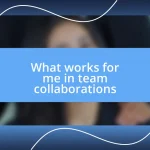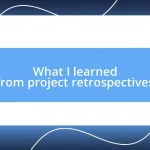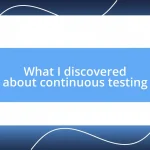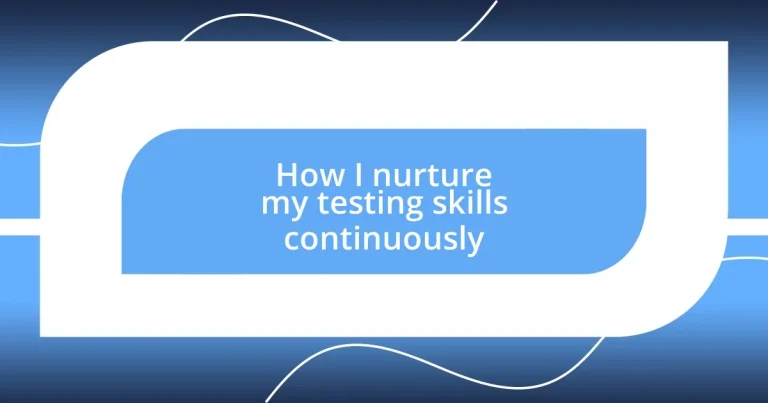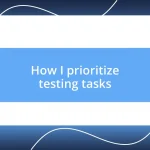Key takeaways:
- Actively seeking and valuing feedback from peers highlights areas for improvement and fosters collaborative growth.
- Setting specific, measurable goals and breaking them down into actionable steps enhances focus, accountability, and motivation in skill development.
- Reflecting on past work and maintaining a journal allows for personal growth assessment and encourages continuous learning in testing practices.
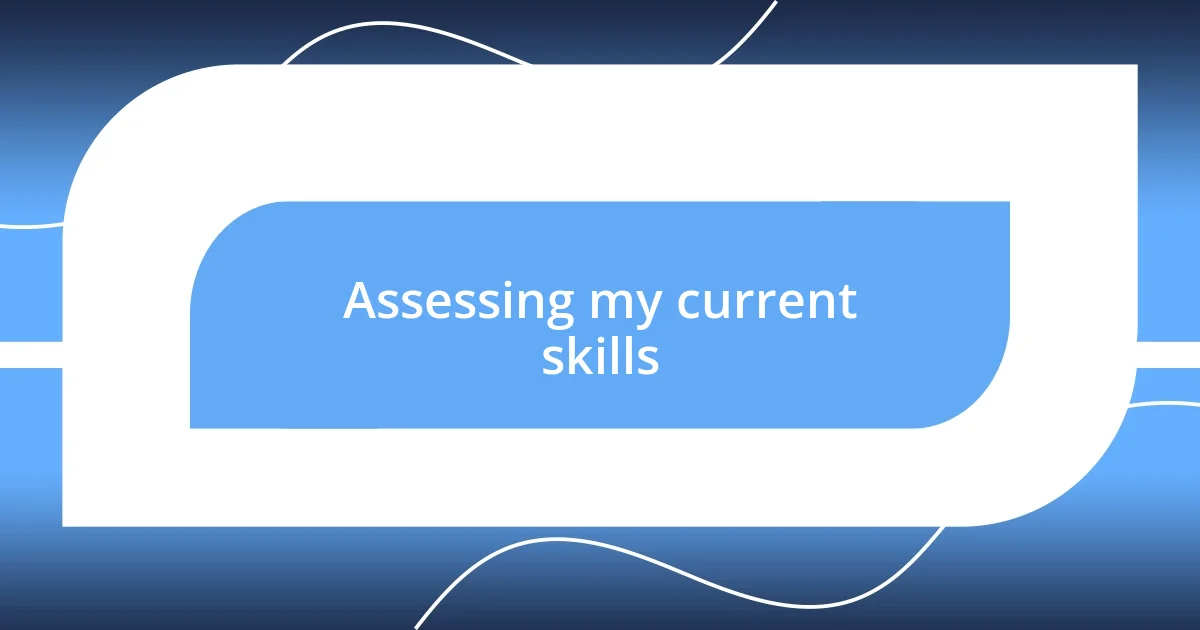
Assessing my current skills
To effectively assess my current testing skills, I often reflect on my recent projects. I recall a time when I missed a critical bug during testing because I rushed through the process. It made me realize just how important thoroughness is; I can’t help but wonder, how many other nuanced issues have I overlooked in my haste?
Another technique I use is actively seeking feedback from my peers. I remember sharing a test case I developed with a colleague who pointed out a significant oversight. That moment was both humbling and enlightening—it showed me that collaboration can illuminate blind spots I might not even be aware of. How often do we pause to truly weigh the insights of those around us?
Lastly, I’ve started keeping a skills journal, documenting my progress and setbacks in testing. It’s a way of tracking growth while also identifying recurring gaps in my knowledge. As I look back through those entries, I sometimes feel a mix of pride and disappointment; this duality pushes me to stay committed to continuous improvement. Isn’t it fascinating how our own reflections can serve as a mirror to our growth?
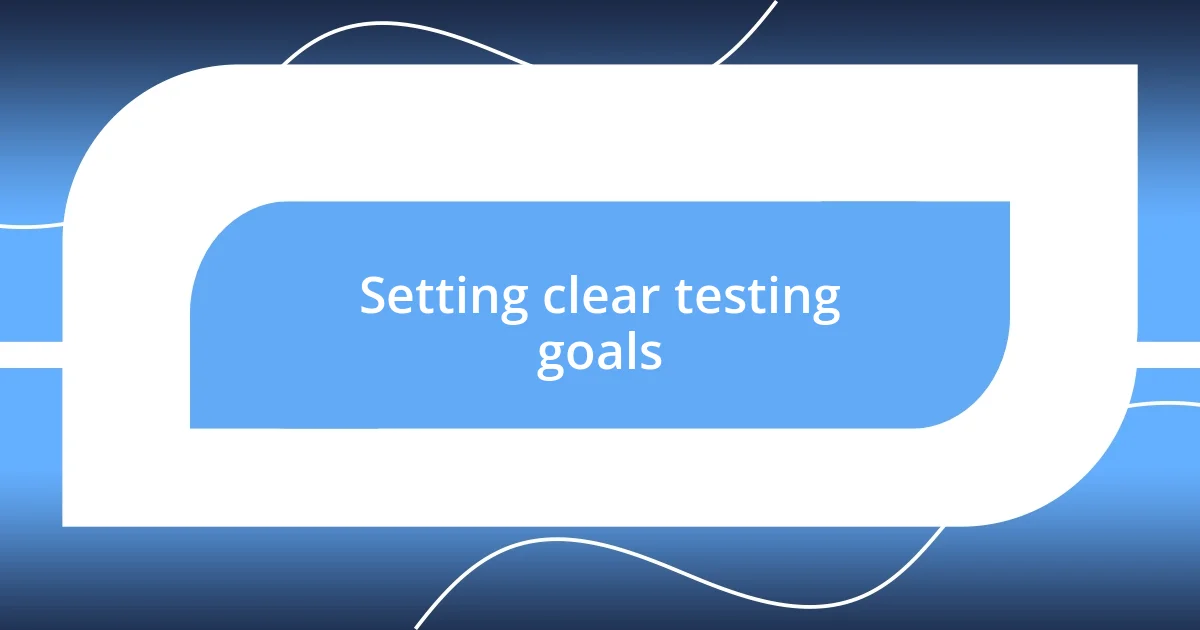
Setting clear testing goals
Setting clear testing goals is crucial for my continuous development. I’ve learned that having specific, measurable objectives helps keep me focused and accountable. For instance, when I set a goal to reduce the number of bugs in my tests by 20%, I found myself being more analytical and precise in my approach. This not only fueled my motivation but also bolstered my confidence in my testing abilities.
To ensure my goals are effective, I often break them down into actionable steps. Here are some strategies that have worked for me:
– Define SMART goals: Make sure they are Specific, Measurable, Achievable, Relevant, and Time-bound.
– Prioritize areas of improvement: Focus on skills that will have the most significant impact on my performance.
– Track progress regularly: I review my goals weekly to evaluate my achievements and adjust my strategies if necessary.
– Celebrate small wins: Recognizing even minor accomplishments helps maintain enthusiasm and motivation.
I remember the first time I reached a goal I set for myself; the feeling of accomplishment was invigorating! It reminded me of the power of goal-setting in catalyzing growth and development in my testing journey.
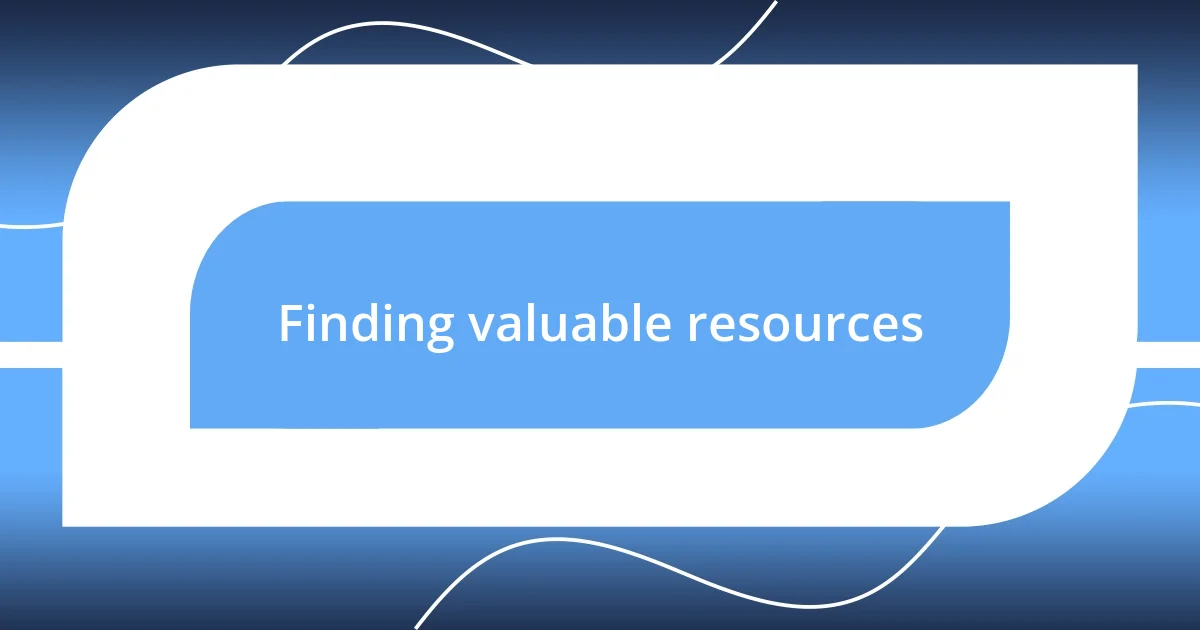
Finding valuable resources
Finding valuable resources can be a game-changer in my quest for enhancing testing skills. I often turn to online platforms, such as blogs and forums, where experienced testers share their insights and lessons learned. For instance, stumbling upon a blog that discussed automation tools helped me realize I was missing out on improvements that could save me countless hours. Have you ever found a resource that completely reshaped your perspective? It’s exhilarating when that happens, isn’t it?
I also believe in leveraging social media groups centered on software testing. The discussions can be invaluable. I once participated in a Twitter chat about accessibility testing, and it opened my eyes to its importance. Engaging with diverse viewpoints not only enhances my knowledge but also inspires me to think outside the box. It’s a reminder that learning doesn’t just happen in isolation; the community plays a vital role.
Moreover, I embrace the power of online courses and workshops. Recently, I enrolled in a course focusing on performance testing, which helped me identify gaps in my understanding. It was tough to juggle my time, but the knowledge I gained has been worth the effort. Have you tried any courses that you found impactful? Reflecting on what you’ve learned can only enrich your testing journey further.
| Resource Type | Example |
|---|---|
| Online Blogs | Software Testing Help |
| Social Media Groups | LinkedIn Testing Community |
| Online Courses | Coursera Software Testing Courses |
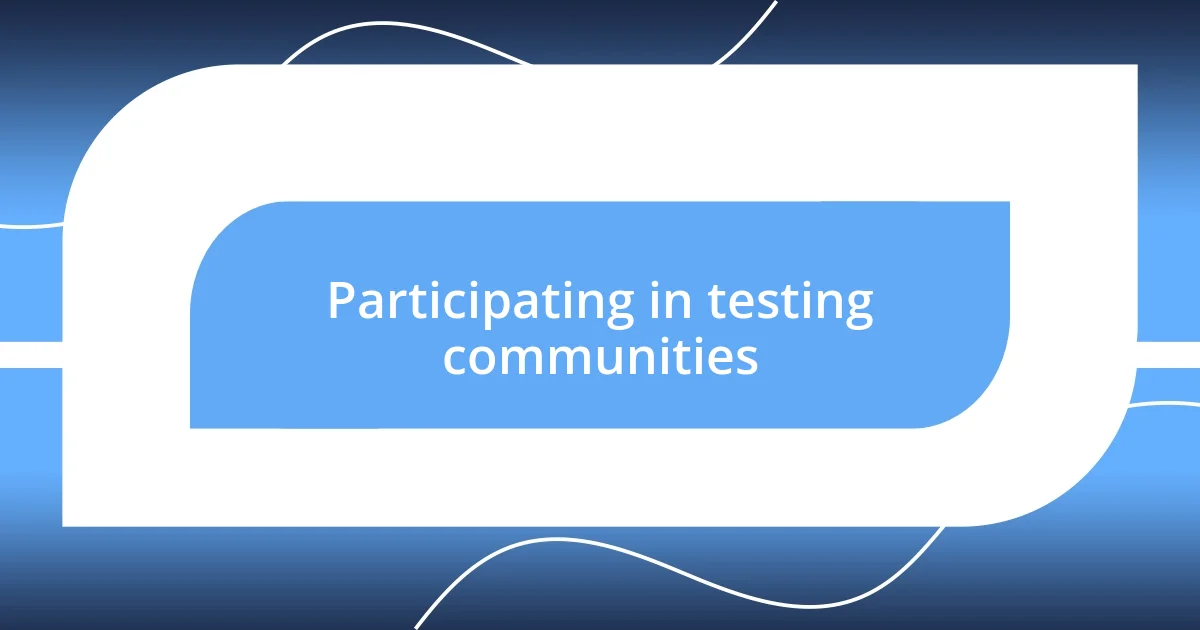
Participating in testing communities
Participating in testing communities has dramatically shaped my testing journey. I remember joining my first local testing meetup, feeling a mix of excitement and nervousness. It was a game changer! Conversations with other testers not only broadened my perspective but also fostered a sense of camaraderie. Have you ever felt that rush of inspiration from connecting with like-minded individuals? It’s invigorating!
The online testing forums have been equally beneficial for my growth. Engaging in discussions about real-world challenges opens my eyes to solutions I had never considered. Just last month, I contributed to a thread about testing in agile environments and received insightful feedback that transformed my approach. It’s thrilling to see how collaboration can lead to learning opportunities, wouldn’t you agree? The collective wisdom of a community can be an incredible asset.
I make it a point to actively participate in webinars and panel discussions hosted by industry experts. I remember one event where a panelist shared their journey in exploratory testing. Their passion for the subject was contagious, and I walked away motivated to apply new techniques in my own work. It’s moments like these that remind me how valuable it is to immerse myself in the community. When was the last time you felt inspired by a conversation? That spark can drive continuous improvement in our testing skills.
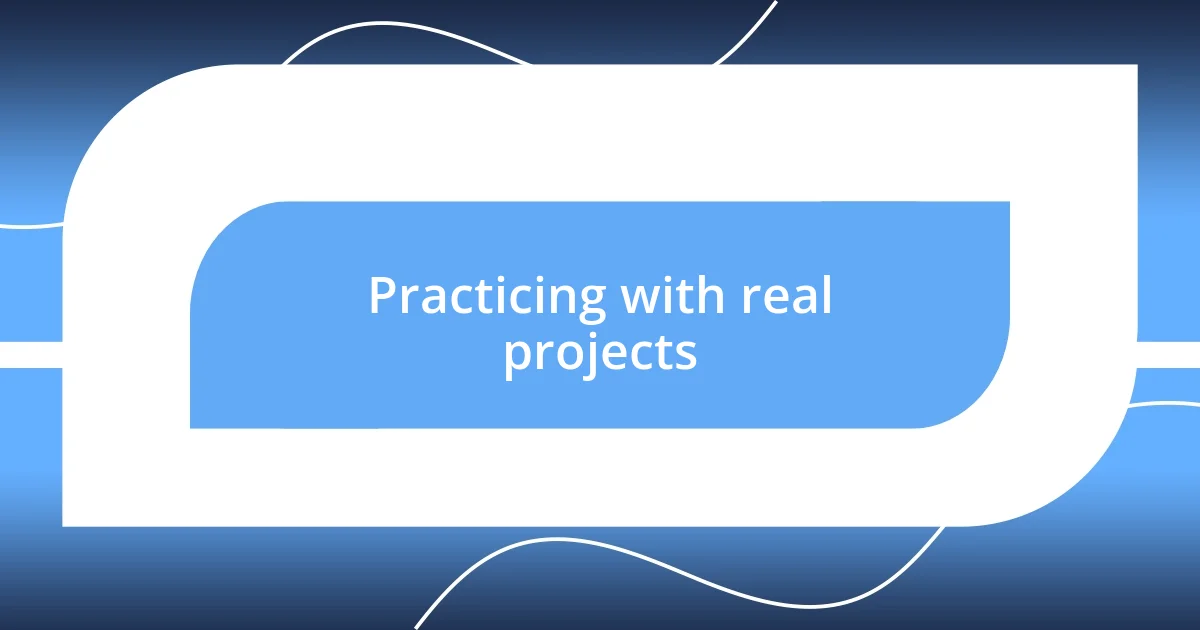
Practicing with real projects
Practicing with real projects is where I truly hone my testing skills. Last year, I volunteered for a non-profit’s website revamp, immersed in real-world scenarios that demanded quick thinking and adaptability. The pressure was intense, but it felt exhilarating to tackle challenges head-on and see the immediate impact of my contributions. Have you ever experienced a project that pushed you beyond your limits? It’s in those moments of trial that we truly grow.
Working on real projects also exposes me to the importance of collaboration. I recall a situation where I had to team up with developers to address a major bug right before a launch. The urgency created an atmosphere of camaraderie, and their insights into the code deepened my understanding. It was fascinating to witness firsthand how different perspectives can lead to effective solutions. Have you found that working in teams enhances your learning? For me, it’s a transformative experience.
Furthermore, tackling diverse projects helps me encounter various testing methodologies. Recently, I participated in a hackathon focused on mobile app development. Navigating different testing strategies, from exploratory to automated testing, expanded my toolkit immensely. The thrill of learning new approaches in a short time was invigorating. Isn’t it incredible how each project provides a unique lens through which we can refine our skills? It’s moments like these that I cherish, continually fueling my passion for testing.
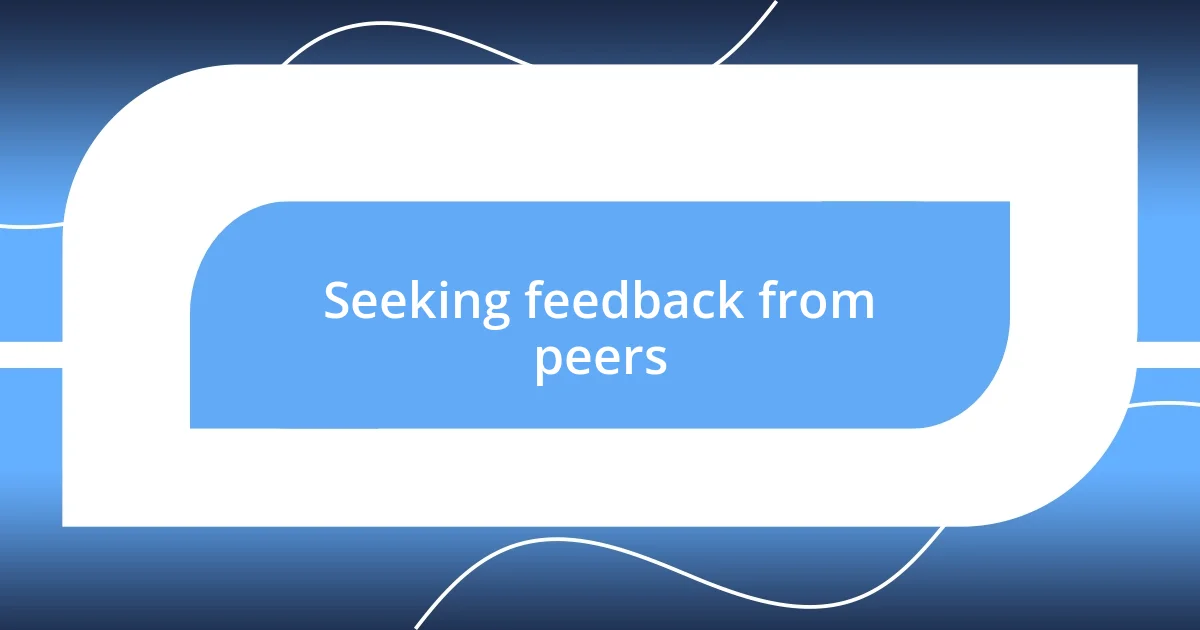
Seeking feedback from peers
Seeking feedback from peers is one of the most invaluable practices I incorporate into my continuous learning. I vividly recall a time when I shared my test case designs with a colleague. Their feedback highlighted areas I had overlooked, and it was a humbling experience. Have you ever had that moment when someone’s insight completely shifted your understanding? Those moments are golden.
In team meetings, I make it a priority to ask for constructive feedback on my work. Just the other day, I presented my approach to a recent testing challenge. The diverse perspectives from my peers sparked a lively discussion that not only enhanced my strategy but also fostered a sense of collaboration. Isn’t it amazing how different viewpoints can illuminate pathways we hadn’t considered?
I have found that regular one-on-one feedback sessions with my peers are particularly effective. For instance, I started a monthly coffee catch-up with a fellow tester, where we exchange ideas and critique each other’s work. It’s amazing how these informal settings can lead to deeper conversations and impactful takeaways. Have you tried this approach? It creates a safe space for vulnerability and growth, making it easier to embrace constructive criticism.
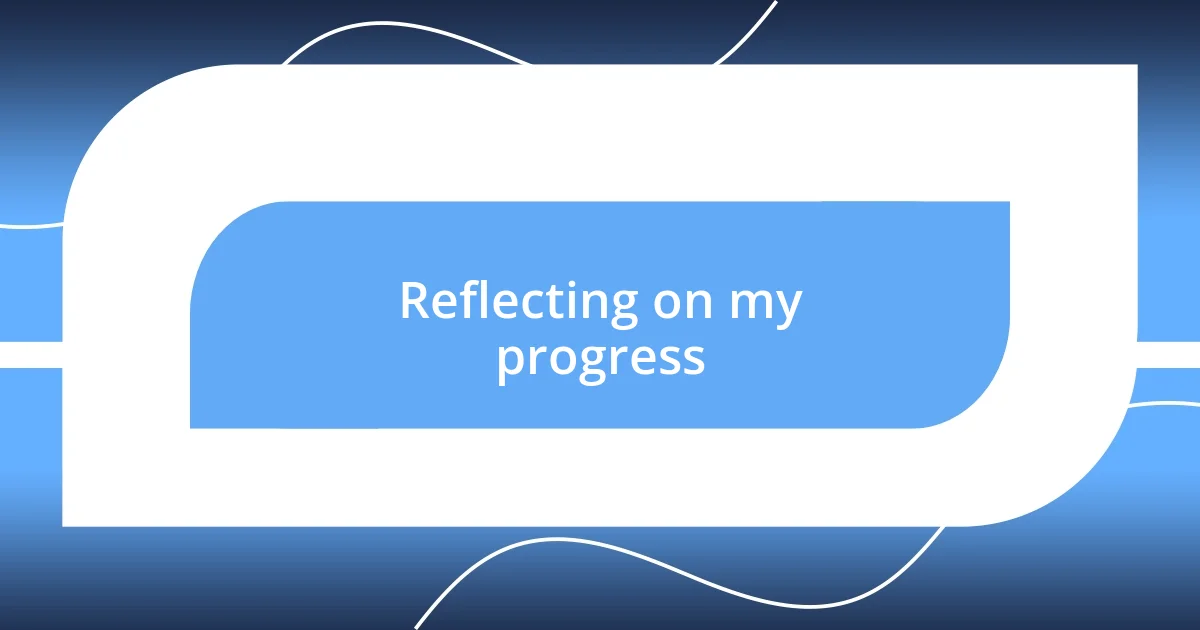
Reflecting on my progress
Reflecting on my progress is something I find essential as I develop my testing skills. I can still recall the moment when I compared my early testing reports to the ones I produce today. Seeing that stark contrast made me realize how much I’ve matured as a tester. Have you ever looked back at your work and thought, “Wow, I’ve come a long way”? That feeling of growth is incredibly motivating.
Each month, I like to dedicate some time to review my completed projects and evaluate what I did well and what I could improve. Just last week, I revisited a project that once felt overwhelming. I was surprised at how small adjustments could have led to even better results. This exercise not only helps in identifying gaps but also fuels my passion for continual learning. How often do you take the time to reflect, and what have you discovered about your own journey?
I also maintain a journal to track my progress. It’s a personal space where I jot down my challenges, successes, and insights gained from each testing experience. Reading through past entries often inspires me, reminding me of my resilience during tough times. Have you considered keeping a journal? It’s more than just a record; it’s a source of encouragement on days when self-doubt creeps in.

